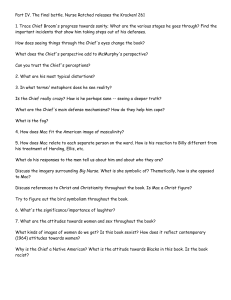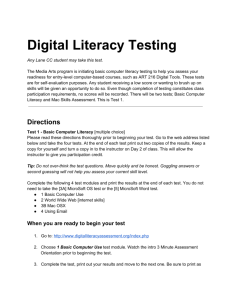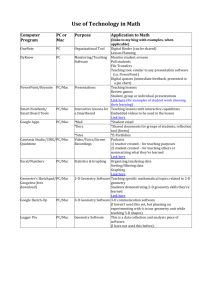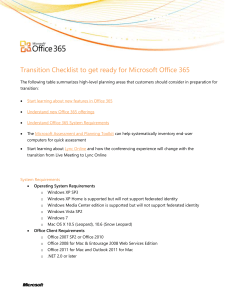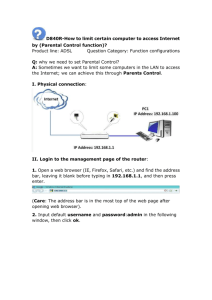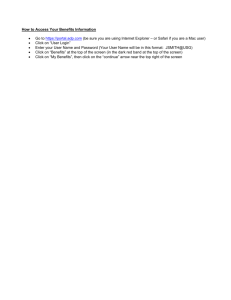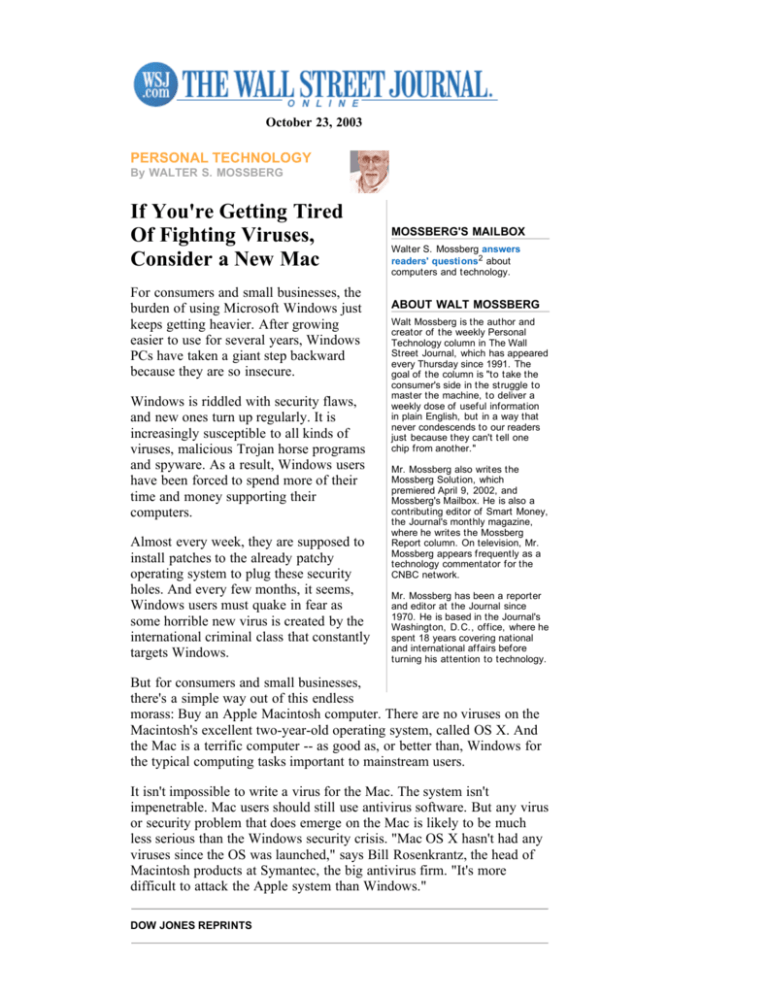
October 23, 2003
PERSONAL TECHNOLOGY
By WALTER S. MOSSBERG
If You're Getting Tired
Of Fighting Viruses,
Consider a New Mac
For consumers and small businesses, the
burden of using Microsoft Windows just
keeps getting heavier. After growing
easier to use for several years, Windows
PCs have taken a giant step backward
because they are so insecure.
Windows is riddled with security flaws,
and new ones turn up regularly. It is
increasingly susceptible to all kinds of
viruses, malicious Trojan horse programs
and spyware. As a result, Windows users
have been forced to spend more of their
time and money supporting their
computers.
Almost every week, they are supposed to
install patches to the already patchy
operating system to plug these security
holes. And every few months, it seems,
Windows users must quake in fear as
some horrible new virus is created by the
international criminal class that constantly
targets Windows.
MOSSBERG'S MAILBOX
Walter S. Mossberg answers
readers' questions2 about
computers and technology.
ABOUT WALT MOSSBERG
Walt Mossberg is the author and
creator of the weekly Personal
Technology column in The Wall
Street Journal, which has appeared
every Thursday since 1991. The
goal of the column is "to take the
consumer's side in the struggle to
master the machine, to deliver a
weekly dose of useful information
in plain English, but in a way that
never condescends to our readers
just because they can't tell one
chip from another."
Mr. Mossberg also writes the
Mossberg Solution, which
premiered April 9, 2002, and
Mossberg's Mailbox. He is also a
contributing editor of Smart Money,
the Journal's monthly magazine,
where he writes the Mossberg
Report column. On television, Mr.
Mossberg appears frequently as a
technology commentator for the
CNBC network.
Mr. Mossberg has been a reporter
and editor at the Journal since
1970. He is based in the Journal's
Washington, D.C., office, where he
spent 18 years covering national
and international affairs before
turning his attention to technology.
But for consumers and small businesses,
there's a simple way out of this endless
morass: Buy an Apple Macintosh computer. There are no viruses on the
Macintosh's excellent two-year-old operating system, called OS X. And
the Mac is a terrific computer -- as good as, or better than, Windows for
the typical computing tasks important to mainstream users.
It isn't impossible to write a virus for the Mac. The system isn't
impenetrable. Mac users should still use antivirus software. But any virus
or security problem that does emerge on the Mac is likely to be much
less serious than the Windows security crisis. "Mac OS X hasn't had any
viruses since the OS was launched," says Bill Rosenkrantz, the head of
Macintosh products at Symantec, the big antivirus firm. "It's more
difficult to attack the Apple system than Windows."
DOW JONES REPRINTS
This copy is for your personal non-commercial use only. To order presentation-ready
copies for distribution to your colleagues, clients or customers, use the Order Reprints tool at
the bottom of any article or visit: www.djreprints.com. • See a sample reprint in PDF
format • Order a reprint of this article now.
Microsoft is working hard on its
security problems. The software
giant has declared that better
security is its No. 1 priority and
is mounting an effort to modify
Windows XP, via an upgrade
due in the spring, to make it
more secure. In fact, the
upgrade, called Service Pack 2,
is so important to the company
that it has temporarily taken
PowerBook running Panther
priority over the next major
version of Windows,
code-named "Longhorn," which now isn't likely to ship before 2006.
So, if you're a Windows user, you could sit tight, apply all the patches,
worry about all the viruses and hope that the spring's Service Pack will
solve most of the security problems without breaking other key features
of Windows or interfering with programs you use.
Or, if the security issues are important to you, you could just buy a Mac
when you shop for your next computer.
Here's why the Mac is so much less susceptible to viruses:
First, the Mac OS X operating system is built on Unix, an
industrial-strength operating system used in business, science and
education. And OS X doesn't enable users -- or hackers who hijack user
accounts -- to alter certain core files and features of its Unix
underpinnings. By contrast, Windows XP users are given "full
administrator" privileges that viruses and hackers can usurp to do
damage.
Also, Apple ships every Mac with all the communications "ports," or
conduits that listen for commands over networks, closed. On Windows,
some of these ports are left open.
In addition, Macs constitute such a tiny share of the world's computers
that they just aren't an attractive target for virus writers and hackers. You
can't take down many computers, so you won't get much publicity.
To do damage to a Mac, virus writers have to construct viruses that are
specific to the Mac. The Windows viruses they churn out can't run on a
Mac, even if they are received in e-mail by a Mac user. Neither can
spyware or Trojan horse programs written for Windows.
Like Microsoft, Apple issues periodic security patches, but they are less
frequent than the Windows patches -- and some of them are needed to
repair flaws in the software programs Microsoft writes for the Mac.
Mac owners are still affected by two other scourges of today's
computing: spam mail and pop-up ads. But even here, the Mac does a
better job of protecting you. The Mac's free, built-in e-mail program,
called Mail, has a spam filter, while the Windows free e-mail program,
Outlook Express, doesn't. And the Mac's built-in Web browser, Safari,
has a built-in pop-up blocker, something that Microsoft's browser,
Internet Explorer, lacks.
This big gap in security and virus susceptibility has altered the balance in
the age-old debate between Windows and the Mac, and made the Mac a
more attractive contender than it was when I last compared the two
platforms in 2002. But it's not the only thing going for the Mac.
Apple will introduce tomorrow an impressive new version of OS X,
called Panther, that can network easily with Windows computers and is
packed with lots of other cool features, some of which Windows can't
match. And the company has recently introduced faster PowerBook and
iBook laptops suitable for consumers and small businesses. Consumer
models of the Mac start at $799 for desktops and $1,099 for laptops.
Not everybody can, or should, jump to Apple. But if you're tired of the
virus wars, the Mac can be an island of serenity.
Write to Walter S. Mossberg at mossberg@wsj.com1
URL for this article:
http://online.wsj.com/article/0,,SB106685931255314300,00.html
Hyperlinks in this Article:
(1) mailto:mossberg@wsj.com
(2) http://online.wsj.com/articles/mossberg_mailbox
Updated October 23, 2003
Copyright 2003 Dow Jones & Company, Inc. All Rights Reserved
Printing, distribution, and use of this material is governed by your Subscription agreement and Copyright
laws.
For information about subscribing go to http://www.wsj.com

